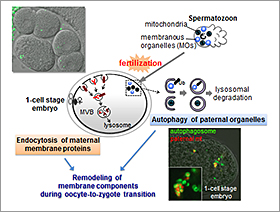
Reserch
Institute for Molecular and Cellular Regulation
Laboratory of Molecular Membrane Biology

Miyuki Sato, PhD, Associate professor
Eukaryotic cells are composed of many membrane-bound organelles郢晢スサ陟輔・d the shape, composition, and functions of these organelles are dynamically regulated under various conditions. Membrane trafficking mediates interorganellar transport and determines the identity of each organelle, and regulation of membrane trafficking is basis of organellar dynamics. The aim of our research is to understand the molecular mechanisms of membrane trafficking and its physiological role in animal development.
Research

During the development of multicellular organisms, each cell changes its nature through remodeling of cellular constituents. In particular, fertilization triggers dramatic cellular remodeling, called the “oocyte-to-zygote (embryo) transition.” Using C. elegans as a model system, we have previously shown that lysosomal pathways are transiently activated during this transition period, and these pathways promote selective turnover of maternally and paternally inherited proteins and organelles. Upon fertilization, autophagy is locally induced around the penetrating sperm, leading to selective degradation of paternal mitochondria and membranous organelles (MOs) (i.e., sperm-specific organelles). This autophagic degradation of paternal mitochondria also explains the maternal inheritance of mitochondrial DNA. Endocytosis is also upregulated during meiosis II, and maternal membrane proteins are downregulated via endocytosis through the multivesicular body (MVB) pathway. Selective ubiquitination of substrates seems to be involved in these processes. Our aim is to elucidate the molecular mechanisms and physiological roles of autophagy and endocytosis in the early embryo.
